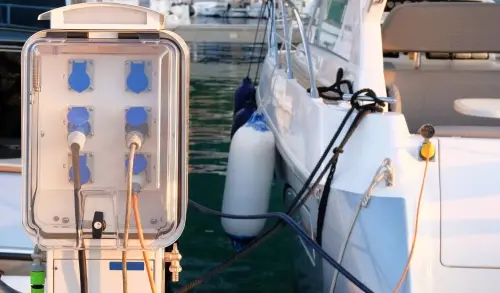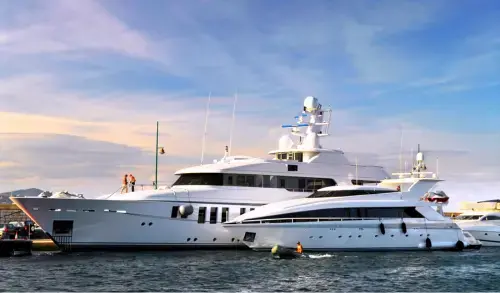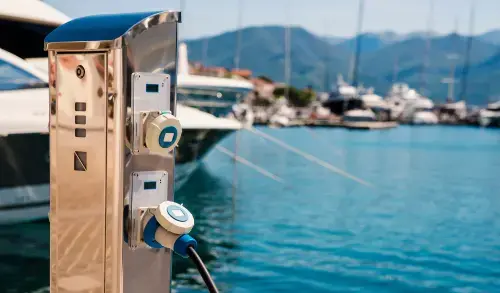How a Shore Power Converter Protects Your Yacht from Marina Power
Marina shore power is often unpredictable. Voltage fluctuations, frequency mismatches, and electrical surges can compromise critical onboard...
3 min read
Atlas Marine Systems : Sep 2, 2025 9:37:00 AM

Today’s yachts require more electrical power than a single shore power cord can reliably deliver, especially in marinas with limited or mismatched power availability. Connecting two cords has become standard practice to meet growing onboard demand.
But managing how power is drawn from those cords makes all the difference. Proportional shore power cord sharing allows a converter to dynamically distribute load based on each cord’s capacity, maximizing available power while preventing overloads. This article explores how proportional sharing works, its technical benefits, and why it outperforms traditional fixed-split systems.
Many yachts use two shore power cords to meet high onboard energy demands. But without intelligent management, those cords can’t always be used efficiently. Basic converters split loads evenly, an approach that often leads to wasted power or breaker trips.
Converters with proportional shore power cord sharing solve this by continuously monitoring each input’s capacity and adjusting load distribution in real time. This ensures safe, optimized use of all available shore power.
Proportional shore power cord sharing is a feature built into advanced converters that intelligently manage dual-shore inputs. The converter adjusts the amount of current drawn from each cord based on its available capacity.
Here’s how it works:
Amperage input by crew – The crew enters the rated capacity of each connected shore power cord via the touchscreen interface.
Dynamic load distribution - Allocates the electrical load proportionately to each cord’s capacity. For example, a 100A and 50A cord would share the load at a 2:1 ratio.
Real-time adjustment – As onboard power demands shift, the converter maintains the proportional power distribution between the two cords.
Overload protection – The system ensures that lower-rated cords aren’t pushed beyond their limits, helping prevent infrastructure strain.
This functionality is only possible with converters that support proportional shore power cord sharing logic, real-time input monitoring, and dual-input capability.
Proportional cord sharing allows yachts to make full use of whatever dock power is available, whether the cords are evenly matched or not. Instead of leaving unused capacity on the dock, vessels can tap into all available amperage, avoiding unnecessary system limitations.
For example, when connected to a 100A and 50A supply, the proportional load sharing will provide a total of 150A of power, which is significantly more than a basic even load sharing, which would be limited to a total of 100A (50A per cord).
Legacy systems with fixed-load splits often cause trips, especially when connecting to uneven shore outlets. Proportional converters help prevent this by automatically adjusting load before cords are overstressed, minimizing power interruptions and the need for crew intervention.
By fully utilizing available shore power, the system reduces reliance on onboard generators. That translates into lower fuel consumption, less maintenance, and quieter operation when docked.
Not all marinas offer matching power outlets. Proportional sharing lets vessels safely adapt to mismatched shore supplies without needing the crew to reconfigure electrical settings. Power is pulled intelligently, even from outlets of different voltages or phases; for example, one cord could be connected to 208V three-phase and the other cord to 220V single-phase.
Instead of relying on two separate converters or complex manual switchgear, a single high-quality converter with proportional sharing handles the task. This reduces equipment footprint, wiring complexity, and installation time.
Load balancing in real time ensures a stable power supply across onboard systems. This minimizes voltage drops or imbalances that could affect navigation, communication, and other sensitive electronics.
With proportional shore power cord sharing in place, both crew and owners can dock with confidence, knowing the vessel can draw maximum available power safely and efficiently, even in challenging or undersized marina setups.
Not all shore power systems are equipped to manage dual-cord input efficiently. Many vessels still rely on fixed-split systems or basic converters that evenly divide the load between two cords, regardless of their rated capacity. This approach creates several technical drawbacks:
Rigid load splitting – Basic converters divide power evenly, regardless of outlet ratings.
Breaker risk – Lower-rated cords are easily overloaded, especially when outlets are mismatched.
No real-time control – These systems can’t adapt as power demand shifts onboard.
Manual oversight required – Crew must monitor loads and make adjustments, adding operational complexity.
Greater reliance on generators – Unused shore capacity means backup power is needed more often.
Proportional shore power cord sharing is a critical feature for maximizing available shore power, reducing generator use, and protecting onboard electrical systems.
Atlas Marine Systems designs advanced converter solutions that intelligently manage shore power input with precision and reliability. Our systems support proportional cord sharing, global compatibility, and seamless integration with complex onboard power architectures.
If your yacht relies on multiple shore connections, don’t settle for outdated fixed-split systems. Talk to our team about upgrading to a smarter, more capable converter built to handle real-world marina conditions.
Explore our solutions or contact Atlas Marine Systems to learn how we can help you power more safely and efficiently.

Marina shore power is often unpredictable. Voltage fluctuations, frequency mismatches, and electrical surges can compromise critical onboard...

Modern yachts are more power-hungry than ever before. High-capacity HVAC systems, advanced navigation electronics, stabilized platforms, and hotel...

A power conditioner powers and protects the expensive technology on your yacht and provides useful additional benefits. Below, Superyacht Technology...